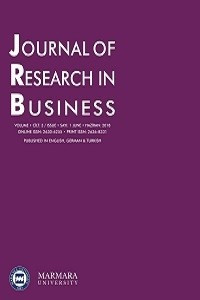Anahtar Kelimeler:
Ramazan Etkisi, Regresyon Analizi, Müslüman Ülkeler, Borsalar
Ramadan Effect On Stock Markets
The month of Ramadan is one the most renowned religious rituals in the world for more than 1.5 billion Muslims. This study analyzes the effect of religious experience during the Muslim holy days of Ramadan on the stock exchanges of 16 Muslim-majority countries. According to the results, among 16 countries, 13 Muslim financial markets have positive returns during Ramadan, which can be attributed to the generally positive investor mood or emotion. In contrast, only 4 stock markets—Dubai Financial Market, Amman Stock Exchange, Karachi Stock Exchange, and Tunis Stock Exchange—exhibit differences that are both positive and statistically significant. Moreover, the study divides the Muslim holy days into 3 periods, where the first period comprises the first 10 days of Ramadan, second period covers the next 10 days of the Ramadan month, and the final period involves the last 10 days. According to results, while the first 10 days witness the lowest performance, the last 10 days experience the highest performance.
Keywords:
Ramadan Effect, Regression Analysis, Muslim Countries, Stock Markets,
___
- Akhter, A., Sandhu, A, Butt S. 2015. Islamic Calendar Effect on Market Risk and Return. Evidence from Islamic countries. Journal of Business and Finance Affairs, 4:140. doi: 10.4172/21670234.1000140. Alatiyat, M., A. 2014. Ramadan Effect on UAE Stock Market. Retrieved December 15, 2015 From https:// www.researchgate.net/publication/263090131_Ramadan_Effect_On_UAE_Stock_Market_-_ Banks_Sector.
- Al-Hajieh, H., Redhead, K, Rodgers, T. (2011). Investor Sentiment and Calendar Anomaly Effects: A Case Study of the Impact of Ramadan on Islamic Middle Eastern Markets. Research in International Business and Finance 25, 345–356. Al-Ississ, M. 2010. The Impact of Religious Experience on Financial Markets. Retrieved November 30, 2015 From https://www.researchgate.net/profile/Mohamad_Al-Ississ/publications.
- Al-Ississ, M. 2015. The Holy Day Effect. Retrieved January 2, 2016 From http://www1.aucegypt.edu/faculty/ alississ/pdf/The%20Holy%20Day%20Effect%20March%202015.pdf.
- Alrashidi, F., Ahmed, M, Beneid, F. 2014. The Calendar Impact and Trading Behavior: an Empirical Evidence From Around the Globe. International Business & Economics Research Journal 13(5), 1025-1032.
- Beit-Hallalmi, B, Argyle, M. 1997. The Psychology of Religious Behavior. Belief and Experience. Routledge, London. Białkowski, J., Etebari, A, Wisniewski, T. P. 2012. Fast Profits: Investor Sentiment and Stock Returns During Ramadan. Journal of Banking & Finance 36, 835-845.
- Create Calendar. Retrieved November 20, 2015. from http://www.timeanddate.com/calendar/custom. html?year=2004&country=74&cols=1&typ=0&display=1&df=1. Countries in the world (Ranked by 2014 population), Retrieved December 10, 2015. From http://www. worldometers.info/world-population/population-by-country/.
- Dini Günler. Retrieved November 10, 2015. From http://takvim.ihya.org/1990-yili-dini-gunler-takvimi.html.
- Frieder, L, Subrahmanyam, A. 2004. Nonsecular Regularities in Returns and Volume. Financial Analysts Journal 60:4, 29-34.
- Husain, F. 1998. A Seasonality in the Pakistani Equity Market: The Ramadhan Effect. The Pakistan Development Review 37:1, 77-81. Iqbal, M. S., Kouser, R, Azeem, M. (2013). Conventional and Islamic Anomalies in Karachi Stock Exchange. Retrieved December 02, 2015, From http://www.sci-int.com/pdf/ 132487349256-999—1007— Rehana%20kausar-Manuscript%20BZ%20Uni.pdf. Nofsinger, J. R. (2002). Do Optimists Make the Best Investors? Corporate Finance Review 6:4, 11-17.
- Population of Muslim Countries. Retrieved December 28, 2015. From https://www.cia.gov/library/ publications/the-world-factbook/fields/2122.html.
- Ramadan’s Calendar. Retrieved November 15, 2015. From http://www.dnzh.com/webservices/ ramadancalendar.aspx. Ramadan in Dubai. Retrieved November 10, 2015. From http://www.dubaifaqs.com/ramadan-in-dubai.php.
- Ramezani, A., Pourahajan, A, Mardani, H. (2013). Studying Impact of Ramadan on Stock Exchange Index: Case of Iran. World of Sciences Journal 1(12), 46-54. Saudi Ummul-Qura Calendar. Retrieved November 17, 2015. From http://www.moonsighting.com/actualsaudi-dates.pdf.
- Seyyed, F. J., Abraham, A, Al-Hajji, M. 2005. Seasonality in Stock Returns and Volatility: The Ramadan Effect. Research in International Business and Finance 19, 374-383.
- Shah, A. R, Ahmed, S. N. 2014. The Ramadan Effect on Stock Market. European Academic Research 1:11, 4712-4720.
- Surah Al-Qadr (97:3). Retrieved December 25, 2015. From http://quran.com/97. Weber, M, 1930.
- The Protestant Ethic and Spirit of Capitalism (Kalberg, S, Trans.). London: Fitzroy Dearborn, 200.
- Yayın Aralığı: Yılda 2 Sayı
- Başlangıç: 2016
- Yayıncı: Marmara Üniversitesi
